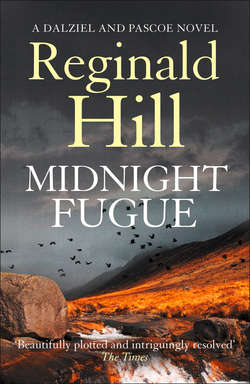Читать книгу Midnight Fugue - Reginald Hill - Страница 12
08.25–08.40
ОглавлениеGina Wolfe watched the bowed, still figure with envy.
He no longer looked fat; the cathedral’s vastness had dwindled him to frail mortal flesh like her own.
She did not know what pain had brought him here, but she knew about pain. What she did not know was how to find comfort and help in a place like this.
She hadn’t been inside a church since the funeral. That was seven years ago. And seven years before that she’d been at the same church for her wedding.
Patterns. Could they mean something? Or were they like crop circles, just some joker having a laugh?
At some point during the funeral her mind had started overlaying the two ceremonies. One of her wedding presents had been a vacuum cleaner, beautifully packaged in a gleaming white box. The small white coffin reminded her of this, and as the service progressed she found herself obsessed by the notion that they were burying her Hoover. She tried to tell Alex this, to assure him it was all right, it was just a vacuum cleaner they’d lost, but the face he turned on her did more than anything the words and the music and the place could do to reassert the dreadful reality.
Neither of them had cried, she remembered that. The church had been full of weeping, but they had moved beyond tears. She had knelt when invited to kneel but no prayer had come. She had stood for the hymns but she had not sung. The words that formed in her mind weren’t the words on the page before her, they were words she had seen when she was seventeen and still at school.
It had been a pre-A-level exercise. Compare and contrast the following two poems. One was Milton’s ‘On the Death of a Fair Infant’, the other Edwin Muir’s ‘The Child Dying’.
She’d had great fun mocking the classical formality of the earlier poem.
It began with child-abuse, she wrote, with the God of Winter’s chilly embrace giving the Fair Infant the cough that killed her. And it ended with an attempt at consolation so naff it was almost comic.
Think what a present thou to God hast sent.
Any mother finding comfort in this, she’d written, must have been a touch disappointed it hadn’t been triplets.
Perhaps her pathetic confusion of the coffin and the wedding gift box was a late payback for this mockery.
The other poem, viewing death through a child’s eyes, she’d been much more taken with. In fact the Scot, Muir, had become one of her favourite poets, though now her love for him, sparked by ‘The Child Dying’, seemed peculiarly ill-omened.
Back then its opening lines–Unfriendly friendly universe, I pack your stars into my purse, And bid you, bid you so farewell–had struck her as being at the same time touchingly child-like and cosmically resonant. But she knew now she had been delighting in the skill of the poet rather than the power of his poem.
Then she had been admiring the resonance from outside; now it was in her being.
I did not know death was so strange.
Now she knew.
And she was sure that the Fair Infant’s mother, Milton’s sister, must have known this too, must have felt the cold blast of that air blown from the far side of despair.
But did she wisely learn to curb her sorrows wild? Had she been able to draw warmth from her brother’s poem and wrap herself in its formality? Find support in those stiff folds of words?
Had she been able to sit in a church and bury her grief in these rituals of faith?
If she had, Gina Wolfe envied her. She’d found no such comforts to turn to.
At least she hadn’t fled. Unlike Alex. She had found the strength to stay, to endure, to rebuild.
But was it strength? For years her first thought on waking and her last thought before sleeping had been of lost Lucy. And then it wasn’t. Did a day pass when she didn’t think of her daughter? She couldn’t swear to it. That first time she’d given herself to Mick, she’d pendulum’d between joy and guilt. But later, when they holidayed together in Spain, she recalled the extremes as contentment and ecstasy with never a gap for a ghost to creep through.
Perhaps this meant that Alex had loved so much he could only survive the loss by losing himself, whereas she…
She pushed the thought away. She could do that.
Was that strength?
Alex couldn’t. The thought pushed him away.
Was that weakness?
These were questions beyond her puzzling.
Maybe that portly figure two rows ahead, sitting as still as the statues on the tomb above him, would have the answers.
